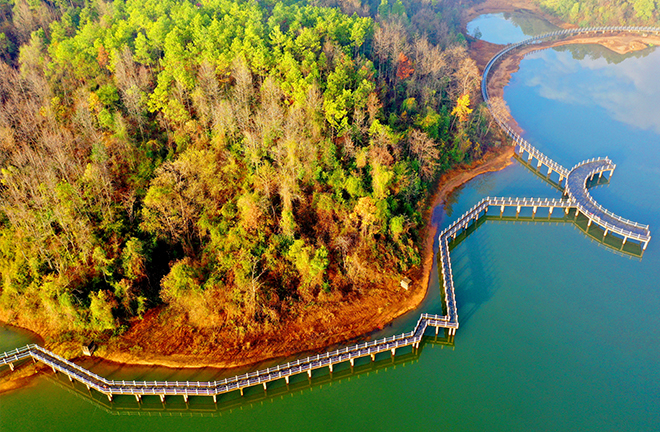Interaction and integration of the digital economy and ‘dual carbon’ goals

Taihe National Forest Park in Jian City, Jiangxi Province, Jan. 12 Photo:CFP
The interaction and integration of the digital economy and achieving the “dual carbon” goals are mainly manifested in the following areas: green and low-carbon development of the digital industry, green and low-carbon transformation of traditional industries enabled by digital technologies, the intelligent governance of urban and rural ecology supported by digital technologies, and the embodiment of the digital value in the green and low-carbon transformation of the economy and society.
Green development
As major national strategic decisions, the “dual carbon” goals have been incorporated into the overall layout of the ecological conservation, which will drive new technological progress, promote new industrial development opportunities, and bring about in-depth and extensive socioeconomic changes. For the digital industry, there is an inherent requirement for green and low-carbon development.
Building green, low-carbon, and efficient digital infrastructure to replace the traditional, locally deployed information systems can effectively reduce carbon emissions and improve energy efficiency. The key point of taking into account both the development of the digital economy and the implementation of the “dual carbon” goals is that the reasonable layout of data centers can improve efficiency and reduce carbon emissions. In addition, co-construction of shared network facilities can also reduce overall carbon emissions of the industry. In the face of increasingly scarce communication network construction resources, basic telecom operators should accelerate the exploration of complementary resources and frequency sharing, and jointly explore new modes of operation.
Green transformation
After years of continuous efforts, China’s digital economy has flourished. It has become a key force in optimizing industrial structures and driving the transformation and development of green and low-carbon industries. It is necessary to further explore a series of ways to effectively coordinate with the “dual carbon” goals and promote the coordinated development of industrial digitalization and green development.
Driven by the digital economy, different fields of the real economy are moving towards green and low-carbon at unprecedented speeds. New products and services characterized by intelligence, energy saving, greenness are emerging rapidly, becoming an important engine to achieve the “dual carbon” goals. New green and low-carbon products based on the intelligent design platform are pouring into the market.
Ecological intelligent governance
The digital economy has expanded to the digital society. In the development of an ecological civilization, government departments should provide various public services for digital transformation and improve the level of intelligent ecological governance.
Advocating and practicing green and low-carbon life is an important component of promoting intelligent urban and rural ecological governance. First, the digital levels of public services should be improved. Second, the research, development and application of digital means of energy conservation and carbon reduction should be accelerated. Third, the adoption of a green and low-carbon consumption mode should be encouraged by virtue of the digital technologies’ advantages.
Digital value
The potential value of data has been widely recognized in all aspects, but there are many types of data, and capitalizing on the data value in the green and low-carbon transformation is emphasized here.
Decisions ought to be data-driven. For one thing, attention should be paid to collecting, monitoring, analyzing, and evaluating data in the green and low-carbon transformation of the society and economy, so as to truly grasp its process and effects. Conducting proper green and low-carbon data analysis and accounting is a long-term, fundamental project. For another, data collected should play its role in supporting government decision-making and satisfying the people’s right to be informed. This requires full use of digital technology to build various green, low-carbon management platforms and support systems at all levels. In short, we should activate the potential of data factors, strengthen data planning and digital governance, accelerate the construction of the digital economy, society and government, and drive the transformation of production, lifestyle, and governance by digital transformation as a whole.
The positive interaction and deep integration of the digital economy and the “dual carbon” goals are conducive to cultivating new drivers of development, improving the quality of development, and promoting the formation of a new pattern of high-quality development.
Du Dong is a professor from the Business School of Hohai University.
Edited by ZHAO YUAN

 PRINT
PRINT CLOSE
CLOSE